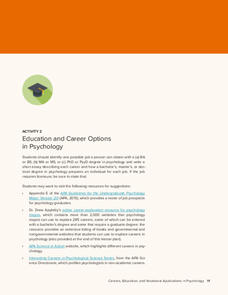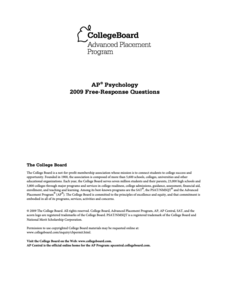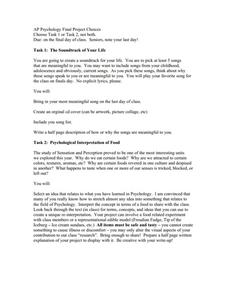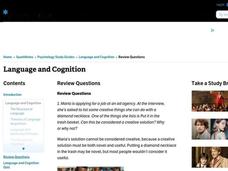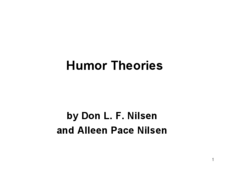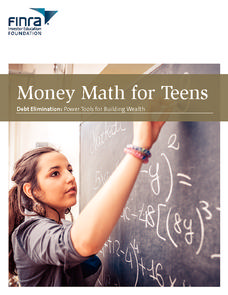American Psychological Association
Top 20 Principles from Psychology for PreK–12 Creative, Talented, and Gifted Students’ Teaching and Learning
Who knew getting a better grasp on learning and psychology requires understanding only 20 principles? The resource, especially ideal for high school Psychology, discusses 20 important principles that debunk common myths and provide...
American Psychological Association
Education and Career Options in Psychology
Psychology class is the perfect time to talk about career options in the field! The resource helps class members research what degree they need to begin different career paths in the field of psychology. Resources include a few websites...
College Board
2001 AP® Psychology Free-Response Questions
What could impact a patient's anxiety, and what should a therapist do to treat it? Learners consider the questions using a prompt from the College Board. A second question asks individuals to consider how key psychological dynamics...
College Board
2009 AP® Psychology Free-Response Questions
Learners examine how psychological factors influence competitors at a dance contest, using materials from College Board.
College Board
AP® Psychology: Teaching Statistics and Research Methodology
Psychologists use statistics? Scholars investigate the research behind the methodology of statistical analysis. Using hands-on practice, case-studies, and scatterplots, they complete various tasks to understand the very roots of high...
Maryland Department of Education
The Concept of Identity Lesson 4: The Psychological Approach
Readers apply Sigmund Freud's theories of the unconscious mind and the psychological approach to literary criticism to analyze and evaluate the relationship between two characters in A Separate Peace.
Pleasanton Unified School District
AP Psychology Final Project Choices
Looking for a way to keep AP learners engaged after the exam? AP Psychology class members engage in self-analysis and present themselves to their colleagues by choosing one of two interesting project choices. Individuals may prepare a CD...
Curated OER
Man's Search For Meaning: Concept Analysis
Designed as a resource for teachers who use Man's Search for Meaning, this seven-page packet includes a list of related informational texts, research issues and project ideas, central questions, background information on World War II and...
Maryland Department of Education
The Concept of Identity Lesson 5: Motivation - Maslow's Hierarchy of Needs
Maslow's Hierarchy of Needs provides the lens class members use to analyze and evaluate the motivations of the characters in Sylvia Plath's "Initiation" and scenes from Mean Girls. Readers then select a character from A Separate...
Curated OER
What Are the Social Studies?
Identify core social studies subjects with adult learners. They will discuss key issues from twentieth century American history and identify key social studies concepts taught at elementary grade levels. They then modify this activity to...
American Psychological Association
A Tasty Sample(r): Teaching about Sampling Using M&M’s
Here's a sweet activity! As part of a study of psychological research methods and statistic gathering, individuals develop a hypothesis about the number of each color of M&Ms in a fun-size package. They then count the number of each...
Curated OER
Introducing Psychology
Students investigate the concept of observable behavior. They watch someone for three to five minutes and record everything that is seen. Students must be as objective as possible, avoid any value judgments about physical appearance or...
Curated OER
Sexual Exploitation
Learners analyze psychology by completing a true or false worksheet. In this sexual health activity, students read assigned text which dictates when it is or isn't appropriate to touch a person and what to do if you feel uncomfortable in...
American Psychological Association
Sampling or Assignment?
Each discipline has its own vocabulary, terms it uses to identify key concepts and processes. Sample, to psychologists, refers to those people (participants) a researcher is studying, while assignment refers to the treatment conditions...
Curated OER
Primary Content Area: Psychology/Counseling
Students explore the concept of a friendship in order to better understand the characteristics that are common to all of them. The use of literature is used in order to provide context for the lesson.
Curated OER
Character Attributes in Writing
Third graders analyze the importance of characters in fiction writing and performances. For this theatre lesson, 3rd graders identify the important characteristics of a fictional character and how to portray a character through many...
Curated OER
The Mozart Effect
Music has been said to effect short term memory. Learners test out this hypothesis, graphing how knowledge retention in a biology classroom changes when music is played in the background. In the end, a better appreciation of the dynamics...
Curated OER
The 16 Habits of Mind
Study the 16 Habits of Mind with a professional resource. Based on Describing 16 Habits of Mind by Arthur L. Costa and Bena Kallick, the resource details 16 ways learners perceive problems around them and produce ways to deal with those...
Curated OER
Language and Cognition
In this psychology worksheet, learners complete 5 short short answer review questions on language and cognition. They explain when a form communication is considered a language.
Curated OER
Humor Theories
Providing ample examples of humor in literature, psychology, and sociology, this presentation studies the concept and function of humor in society today. Covering what is classically "funny" and what is not, and why, the slideshow will...
American Psychological Association
Statistical Significance
Our survey says ...! High school psychology scholars analyze how people create surveys. Three different scenarios help them discover the meaning behind statistical significance. Armed with new knowledge, novice psychologists uncover what...
Money Math for Teens
Debt Elimination - Power Tools for Building Wealth
What does it mean to be wealthy? Your learners will consider how carrying debt affects budgeting, and learn about the debt snowball strategy and how is it used in the concept of eliminating debt in order to build wealth.
Curated OER
Exploring Learned and Innate Behavior
Students explore the differences between learned and innate behavior among humans and monkeys. They complete an assignment and read articles about two studies, which used similar test methods to show that infants and monkeys share an...
Curated OER
Lesson: Paul Chan: Tree of Life
Paul Chan's work has been known to show the cycle of change. Learners explore the concept of change by analyzing his work and reading the poem "For Which it Stands." They consider symbolism, communication, art, and society as they use...



